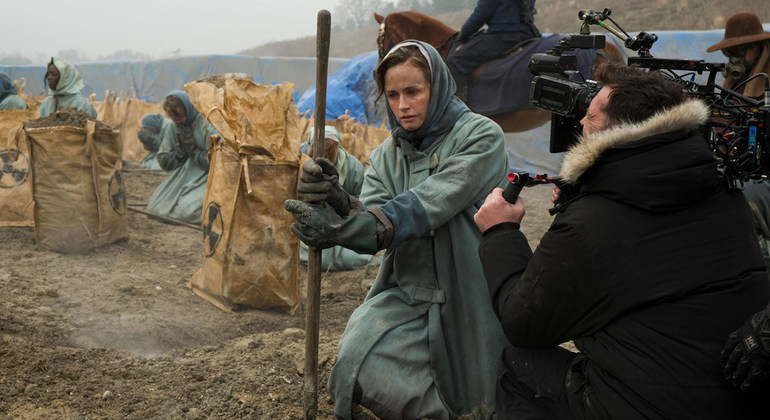The TV version of The Handmaid’s Tale is based on the classic 1985 book of the same name by acclaimed author Margaret Atwood, about a dystopian USA, renamed Gilead, ruled by a brutal theocracy in which people, particularly women, have been stripped of their rights.
In the story, an environmental disaster has led to most women becoming infertile, and the small number who are still able to become pregnant are forced to become handmaids, sexual slaves who are raped by the ruling elite in order to provide them with children.
Atwood frequently said in interviews that everything described in the book is happening, or has happened, somewhere in the world. The producers of the TV version, mindful of the status of the book’s legacy, have been careful to take the same approach.
Playwright Dorothy Fortenberry is one of the writers of the show. She told UN news that, whilst the book reflects 1980s concerns about the environmental impact of nuclear incidents, and acid rain pollution, the writing team felt that it was important to make climate change the backdrop to the societal collapse that brings about Gilead.
“We researched how things like higher temperatures and plastic pollution could affect fertility (we’re currently seeing a decline in fertility worldwide), and the emergence of climate-related diseases. We wanted the series to feel as grounded in reality as possible.”
One of the ironies of the show is that the authoritarian rulers of Gilead have successfully dealt with many aspects of climate change, banning fossil fuels, driving in electric vehicles, and ending plastic pollution.
“Climate change is an event, it doesn’t have a politics, and it’s not necessarily the case that accepting and dealing with climate change would lead to progressive policies: a pro-environment movement could also be fascist, anti-immigrant and repressive”.
Ms. Fortenberry and her colleagues also wanted to ensure that the many human rights issues raised in the show are realistic, frequently discussing the issues with Andi Gitow, who runs the UN’s Creative Community Outreach Initiative (CCOI). Ms. Gitow said that the team took great pains to get the details right.
“We started with open-ended conversations, where the team would ask, for example, what it’s really like to live in a conflict zone, how does international law work in practice. Then I brought in experts, including someone who lived in Aleppo, Syria, and an international human rights lawyer”.
“The team wanted to know what refugees experience emotionally and practically, and how refugee centres operate. For example, when Emily, one of the characters, crosses the border into Canada, she’s met by an all-female team who tell her that she’s safe. And when Hannah (the lead character), is reunited with her daughter, it’s not the usual Hollywood reunion: there’s a mix of fear, anger and misunderstanding, which is what can often happen in the real world”.
The power of drama
The international success of The Handmaid’s Tale has meant that millions of people are now aware of the issues contained within the drama, often for the first time.
“Drama is one of the most powerful mediums”, says Ms. Gitow. “Of course, reports, documents and meetings are very important. But drama give you the ability to reach a mass audience who might not otherwise be exposed to these issues, and might not otherwise seek out information about them”.
However, the writers strive to avoid pushing a particular agenda, and focus on telling strong stories, with complex, three-dimensional characters coping with extraordinary circumstances.
“If you want to get across a certain point of view, it’s better to write an op-ed”, says Ms. Fortenberry. “That said, we consciously show normal, middle-class women in the US going through some of the experiences that are happening right now to women elsewhere in the world. By doing so, we’re bringing specificity and humanity to some of the horrors taking place, from climate change to gender violence. When you see the effects on one person, you can relate to them”.
“With a drama, you see issues lived and played out by a character you connect with”, adds Ms. Gitow. “You think of yourself, your mother, boss, or best friend in that situation, and it becomes very real. You imagine how you would react in that situation. The news can give you detail, but it can’t do that”.






